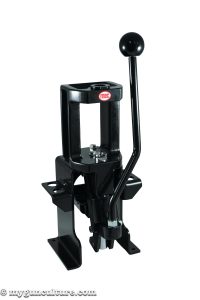
The MEC Marksman reloading press, shown with optional mount.
Unexpected things happen on rare occasion. Pigs fly, reality TV personalities get elected President, and the folks at MEC get into the metallic reloading business.
Well, this one is a welcome addition. The folks at MEC Shooting Sports have been the leading designer and manufacturer of reloading presses for shotgun shells since, well, the beginning of forever. I’ve been using one of their MEC Sizemaster units for at least 15 years to reload .410 shotshell ammo for my Winchester 9410 lever action shotgun. Yes, it’s a really unusual, and fun, gun, but that’s a story for another day.
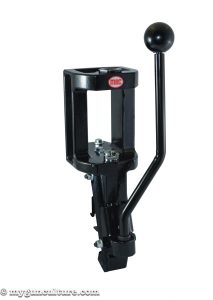
Note how the cast iron frame is completely out of the way on the MEC Marksman reloading press.
As I recently found out, the MEC team is getting into the metallic cartridge reloading game in a big way. I got my hands on a MEC Marksman single-stage reloading press to kick the tires a couple of months ago. I’ve held off commenting until I had the opportunity to use the Marksman for a while because reloading presses are tools that don’t always show their true value, or possibly quirks, until you’ve reloaded thousands of cartridges of different calibers. The result? I’m impressed. Let’s take a closer look.
The Marksman is a substantial press. I estimate the weight of the cast iron unit to be about 1.2 billion pounds. OK, I didn’t actually weigh it, so that’s admittedly more of a guess. You want a press to be heavy and massive, so it remains stable while you’re applying force to do things like reshaping brass cartridge cases, jam bullets into place, and so on. The beefier the press it, the less likely it is to move around during operations that require great precision and repeatability to preserve the accuracy of the final product. Yes, I know you always want to bolt them to a solid platform, but weight still helps with overall stability, even with a quality mounting job.
I requested the optional base, which I think is a must have item, mainly because I’m spoiled rotten. But seriously, the base does a couple of things for you. It raises the press to a height, which for me anyway, is perfect for standing operation – you don’t have to hunch over for hours at a time. The base also gives you a little more flexibility in mounting location. While you still have to mount the press close to the edge of your table or bench to allow room for handle movement, the base allows you to set the unit back a bit farther from the edge of your bench. Last but not least, the base adds storage for reloading dies in four different holes. You also have space underneath the press for miscellaneous stuff like your load data sheets.

Note how the handle attaches to the center of the MEC Marksman reloading press. That prevents sideways torque and it’s reversible for left-hand operation.
The operation is exceptionally smooth. The linkage in the press has no slop at all, so there’s no wasted motion or energy while operating the press. The lever also attaches to the direct center of the linkage mechanism, so there is no built-in torque on one side or the other. The handle is reversible, so if you like to operate the ram with your left hand, just adjust, and you’ll be all set with no usability penalty. Speaking of ambidextrous operation, the frame of the press itself is also right and left hand friendly. Rather than a classic “O” shape or worse yet, an offset “O” shape where the front of the frame favors one side or the other, the MEC Marksman has a completely exposed front work area. Either hand can access the piston for shell placement and removal with no obstructions. I really grew to love this feature. It also helps with illumination. There are no frame components in the front to cast shadows on the workspace.
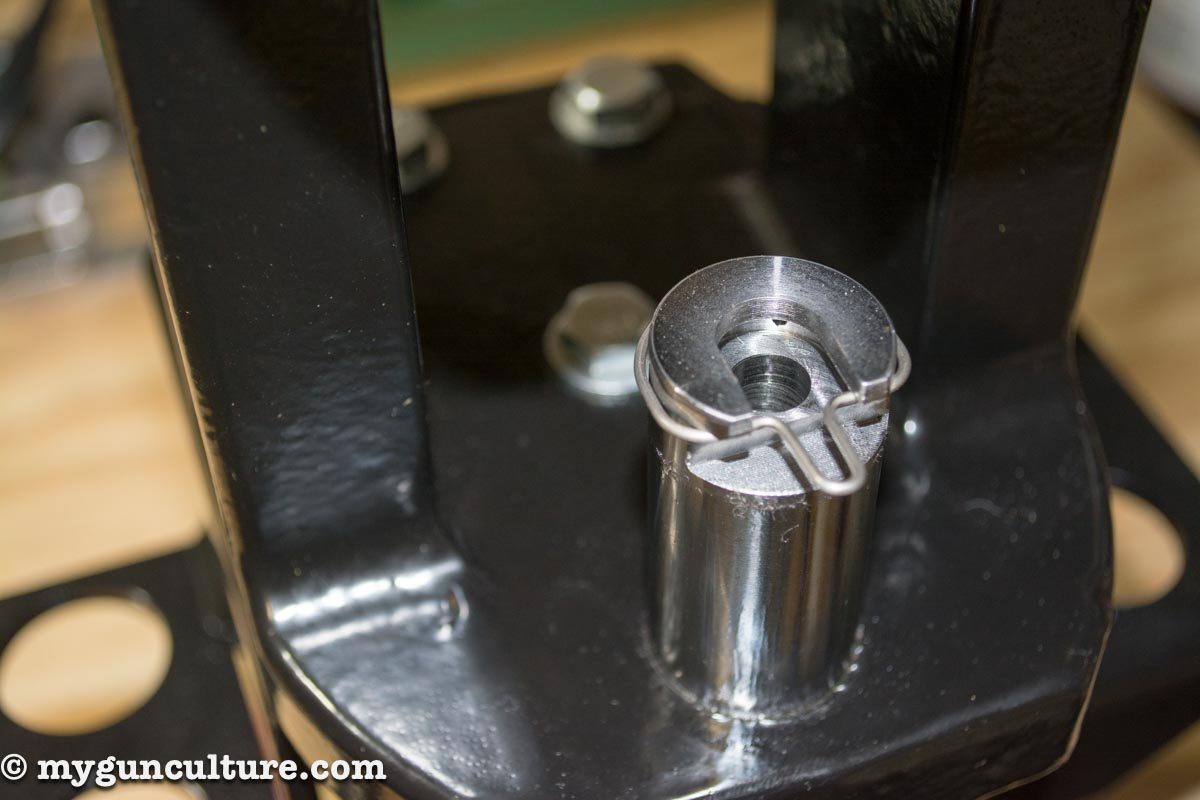
The self-centering shell holder is a big deal on the MEC Marksman reloading press. It ensures that the case enters dies perfectly vertical.
The MEC Marksman also features a self-centering shell holder. A clip spring mechanism gently locks the shell holder to the piston but allows the shell holder to float around. The idea is that this avoids any cant caused by tension on the shell holder which can lead to bullet runout. In English, that means that a shell holder with a pressure mount might hold the case slightly cockeyed, which might also cause a bullet to be seated slightly wonky. If the bullet isn’t seated perfectly straight in the cartridge case, then accuracy will suffer. I did a little science and wrote and article on that topic that shows just how easily a wonkily-seated bullet can turn an accurate rifle into a raging dumpster fire. The “free-float” nature of the self-centering shell holder allows the shell to float and therefore center itself vertically on the piston upstroke.
This works pretty darn well, although I found you need to let it do its job. The idea is that the shell holder mounts to the ram with a good bit of play. Not having pressure on the shell holder ensures that it stays level, which helps make sure your resizing and seating operations are precise. If you trust the system, the shell holder will center itself on the upstroke and the shell holder will center the cartridge case for easy insertion into the die. If you try to manhandle or guide it, you lose the benefit of the self-centering function. One of the things I tested was resizing a boat load of .223 Remington brass. With its small case mouth, it’s easy to miss the decapping pin if the case doesn’t raise to the resizing die in the dead center. This operation worked like a champ on the MEC 1080 Marksman.
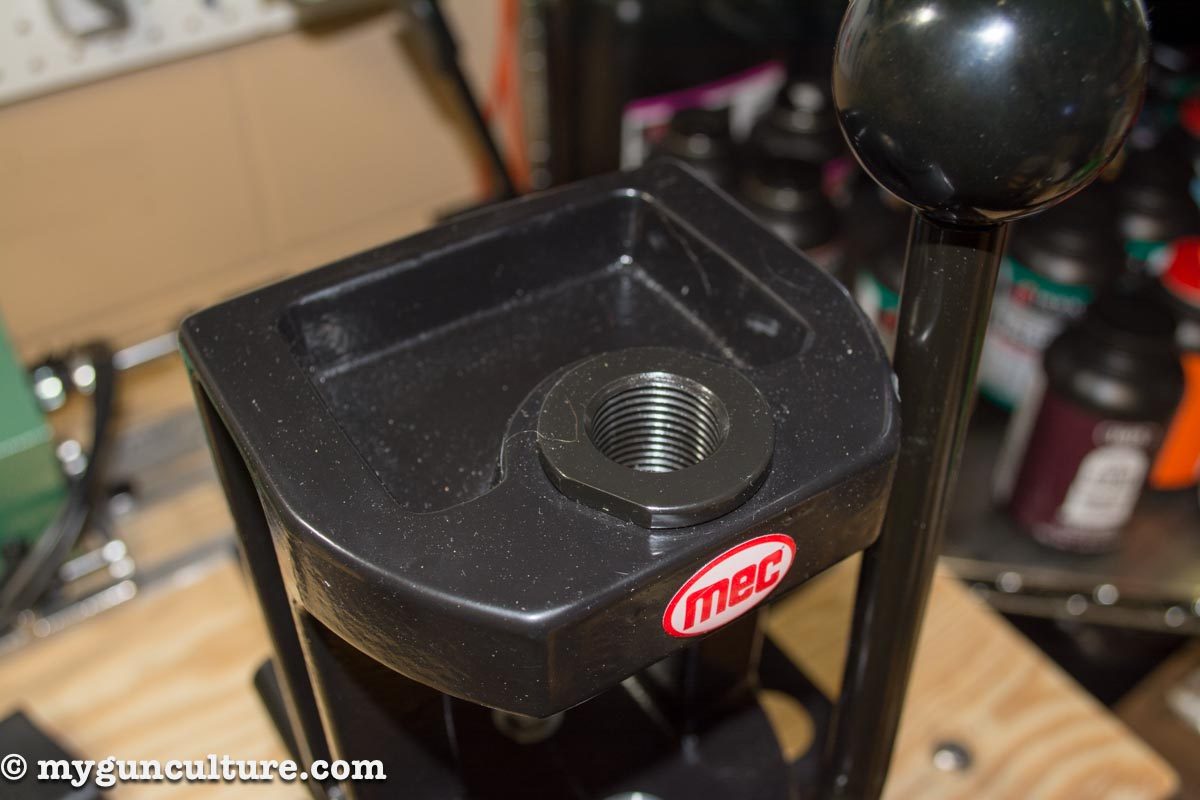
The top of the MEC Marksman reloading press has a built-in tray that’s handy for Allen wrenches, bullets, or whatever else you want to keep up there.
The MEC Marksman also features a cleverly-designed spent primer catcher tray. It hangs with a solid clip in an out of the way location underneath so you don’t knock it off the press while doing other things. I was optimistic about the spent primer catching system on the new MEC because that’s historically a weak spot with most any press I’ve ever used. As the resizing die knocks the spent primer out of a cartridge case, it falls through the center of the ram and out of an angled hole towards the bottom. There’s a plastic tray that suspends on the rear side of the press that catches the primers.
The challenge with any system is that primers don’t always fall out immediately when pushed by the depriming pin in the die. Sometimes they knock right out while other times they hang on for an extra split second before falling. And on occasion, the downward movement of the ram is what finally jars a primer loose. You can get more consistent results by adjusting the decapping pin to a pin extending far out of the bottom of the die, but that comes at a cost. The longer the pin extends, the more likely it is to sway slightly off center and break when it misses the flash hole in the case. With the big batch of .223 Remington resizing, the tray caught most of the primers, perhaps 75% or so. The rest dropped out of the port in the ram later in the down stroke, so they ended up on the table below the press. I’ll be finding a tray that just sits on the table underneath the press mount. That will surely catch them all.
So far, I’ve loaded hundreds of rounds each of .32 ACP, 9mm, 6.5 Creedmoor, .308 Winchester, and .223 Remington. The only round that has been finicky was the .32 ACP, but that’s finicky on every press I’ve ever used due to its small size, soft case walls and tiny bullets. With super-small handgun cartridges, you might have to guide the case into the resizing die as it doesn’t have quite enough bulk to let the self-centering shell holder do its job. Larger handgun calibers and rifle calibers work like a dream, and that’s really where the self-centering system shines. I’ve been using the MEC Marksman – a lot – for resizing .223 cases and it’s proven to be fast and sure with very, very rare instances of a case hitting the die off center.
This is a solid press. Highly recommended.
Factory MSRP is $225.

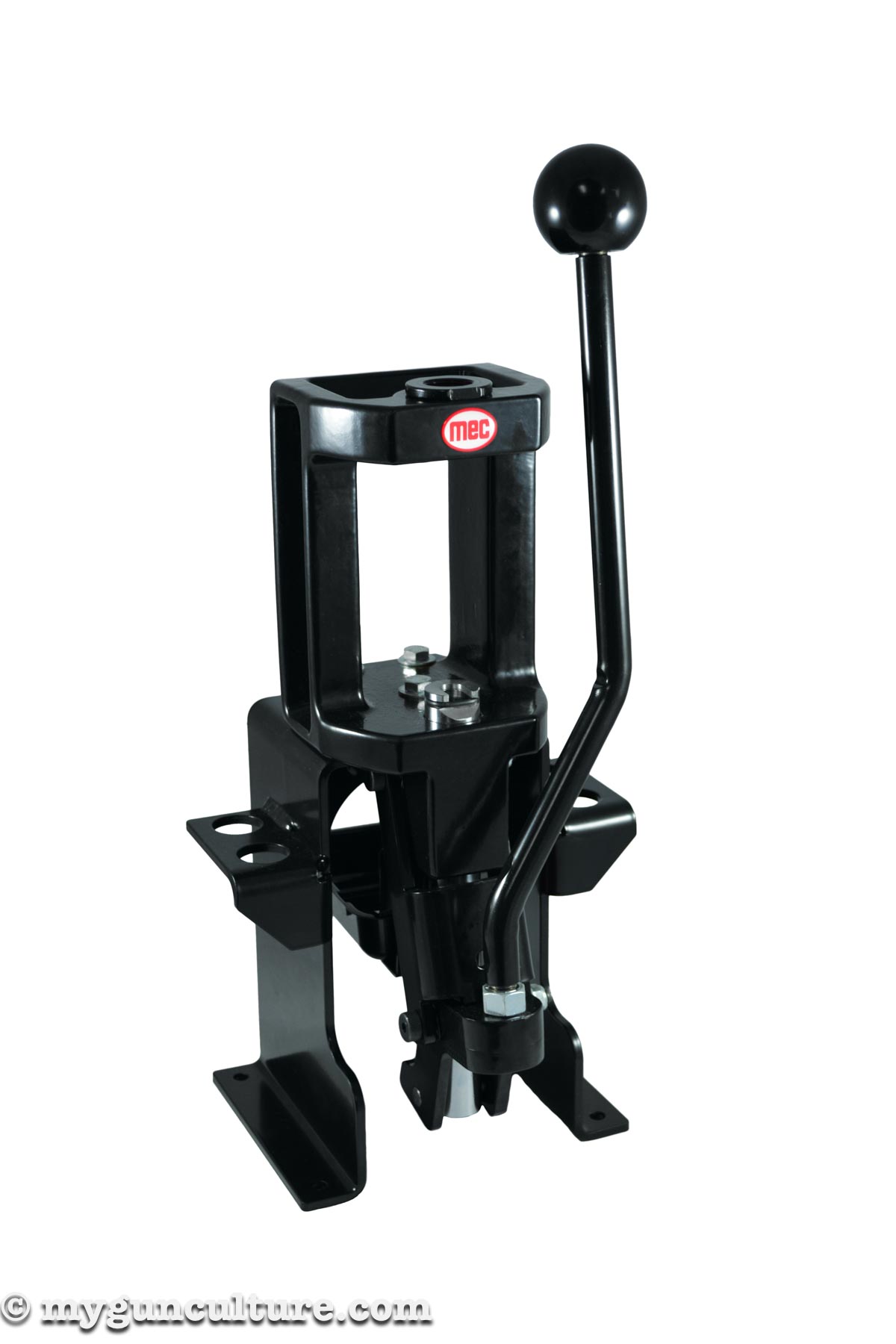
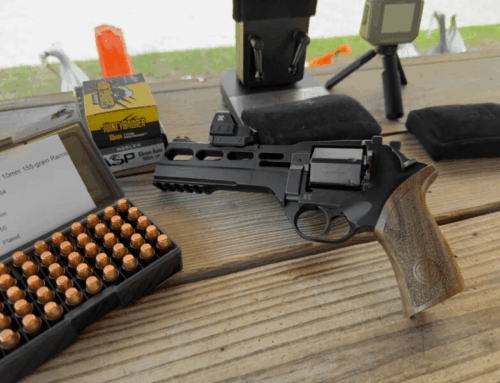
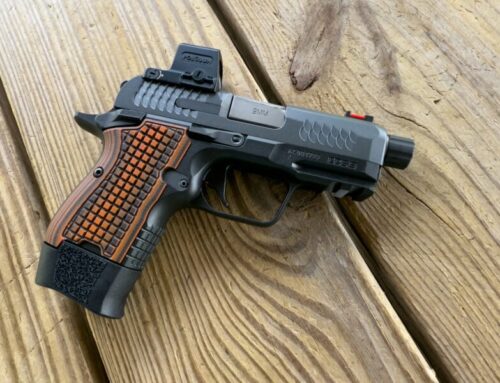

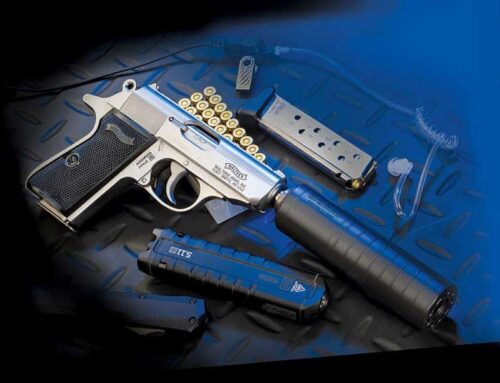
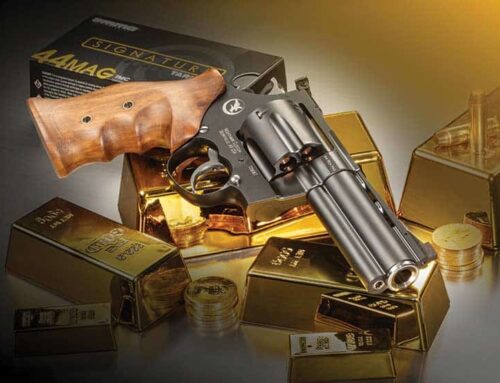
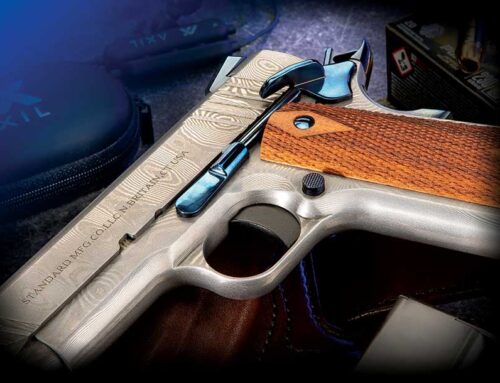
Since it has a self centering shell holder can you use a universal decapper? I use a Lee decapper and do several K at a time without breaking a pin. If the press needs to align itself on a case it seems to me that a Lee decapper may not work since the decapping pin may not line up on the primer hole causing the pin to break. Primer removal is the very first step I do for reloading of all of my spent brass before I start my cleaning process. This is a must for me. I do want to buy this new MEC but I need to know that it will process thousands of primer removals without breaking any pins in my Lee Universal Decapper. Can someone get back to me on this question.
Hey Dane – I didn’t have any trouble with decapping only operation, but as decapping without breaking pins depends far more on technique than equipment, I can’t guarantee that you can do thousands without breaking a pin. I would suggest talking to the folks at MEC to see if that have any additional insight on this.
Thanks,
I did ask them the same question but I haven’t heard back from them yet. I may give them a call next week.
I do understand about techniques and setup with decappers. Generally I will go through 5k to 6k of brass before I get a breakage. I don’t have an issue with that. They can’t last forever. Usually my pins will break while doing 556.
If you’re breaking pins on Lee than you’re doing something wrong, it’s designed so that it will push decapping rod up if it hits something solid besides primer. Long time ago I bought extra decapping rods just in case I break one and in 5 years I haven’t broken one and I did thousands and thousands of 223 rounds and other calibers. I did break Reddington pin on 221 FB recently because my progressive press got misaligned but that was my fault, that and it seems to be decapping rod is crooked (I know it’s hard to believe it it’s a Redding die).
So many nice single stage presses I might just have to own 4 or 5. At that point I guess I wouldn’t need a progression either
I bought a MEC Marksman and I love it!